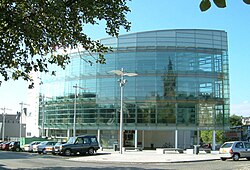Medical education in Scotland includes the education of medical students and qualified medical doctors in Scotland.
Medical education in Scotland includes the education of medical students and qualified medical doctors in Scotland.

Scotland has five medical schools: Edinburgh, Glasgow, St Andrews, Dundee and Aberdeen. [1]
The undergraduate medicine MBChB courses at Glasgow, Dundee and Aberdeen are 5 years long; [2] [3] [4] the MBChB undergraduate degree at Edinburgh is 6 years long; [5] and St Andrews has a 3 year BSc degree before students finish the last 3 years at a partner university to obtain an MBChB/MBBS. [6]
The graduate entry course, known as ScotGEM is four years long with the first and second year at the University of St Andrews and the third and fourth year with the University of Dundee. [7] [8]

All five participate in the Reach national initiative, with applications from the poorest 40% of areas increasing by 60% since the beginning of the initiative. During the same period, the number being accepted from the same areas has increased by 50%. [1]
The number of medical school places in Scotland for the last five years was as follows;
In 2019/20, an increased target was set for the number of Scottish students enrolled at medical school. [11] All medical school places in Scotland were increased by another 15-20 places for 2023. [12]

| Medical School | Core | ScotGEM | Widening Access | GP Track | HCP-Med | International | Total intake target |
|---|---|---|---|---|---|---|---|
| Aberdeen | 200 | - | 24 | 55 | - | 19 | 298 |
| Dundee | 180 | - | 24 | - | - | 16 | 220 |
| Edinburgh | 245 | - | 25 | - | 35 | 21 | 326 |
| Glasgow | 269 | - | 25 | 30 | - | 22 | 346 |
| St Andrews | 145 | 70 | 12 | - | - | - | 227 |
| Total | 1,039 | 70 | 110 | 85 | 35 | 78 | 1,417 |
Following completion of medical school, junior doctors then enter a vocational training phase. In Scotland a doctor's training normally follows this path:
The Scottish Foundation School covers the four regions of Scotland: North, East, South East and West. It is managed by the Foundation Programme Board and the Foundation Programme Directors are responsible for Foundation training in each region. [13]
The training standards for Foundation year 1 are published by the General Medical Council (GMC) :Outcomes for Provisionally Registered Doctors" (GMC July 2015). The two-year programmes are delivered within the national operational framework agreed by the Departments of Health. The curriculum is approved by the GMC. [13]
To train as a general practitioner (GP), after completing a Foundation Programme (not limited to Scotland), a doctor must complete three years of speciality training (ST). This comprises a minimum of 12 to 18 months of posts in a variety of hospital specialities - often including paediatrics, psychiatry, geriatrics and obstetrics & gynaecology. [14]
After successfully completing a Foundation Programme (not limited to Scotland), doctors can pursue Core Training (CT) that lasts two to three years which depends on the specialty. After completion of CT training, doctors can enter a ST post via open competition. [15]
Alternatively, those who complete a Foundation Programme can apply for a run-through programme which lasts five to seven years. [15]
In NHS Scotland, a doctor must train for a minimum of six years training in a speciality to attain a certificate of completion of training (CCT) and be listed on the GMC's specialist register in addition to a full license to practice. Those that did not train in the UK can apply for the Certificate of Eligibility for Specialist Registration (CESR) route instead of CCT. to apply for a consultant role in NHS Scotland, a doctor must apply directly to a job advert on the NHS Scotland jobs website. [16]
| Year | Current (Modernising Medical Careers) | Previous | ||
|---|---|---|---|---|
| 1 | Foundation doctor (FY1 and FY2), 2 years | Pre-registration house officer (PRHO), 1 year | ||
| 2 | Senior house officer (SHO), minimum 2 years; often more | |||
| 3 | Specialty registrar, general practice (GPST), minimum 3 years | Specialty registrar, hospital speciality (SpR), minimum 5 years | ||
| 4 | Specialist registrar, 4–6 years | GP registrar, 1 year | ||
| 5 | General practitioner, 4 years total time in training | |||
| 6–8 | General practitioner, minimum 5 years total time in training | |||
| 9 | Consultant, minimum 7 years total time in training | Consultant, minimum 7–9 years total time in training | ||
| Optional | Training is competency based, times shown are a minimum. Training may be extended by obtaining an Academic Clinical Fellowship for research or by dual certification in another speciality. | Training may be extended by pursuing medical research (usually 2–3 years), usually with clinical duties as well | ||